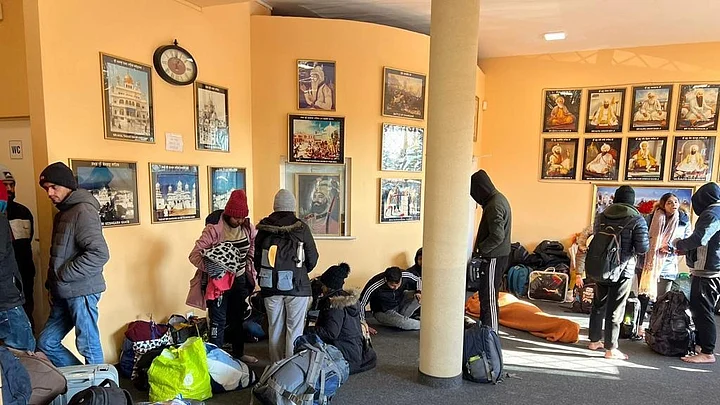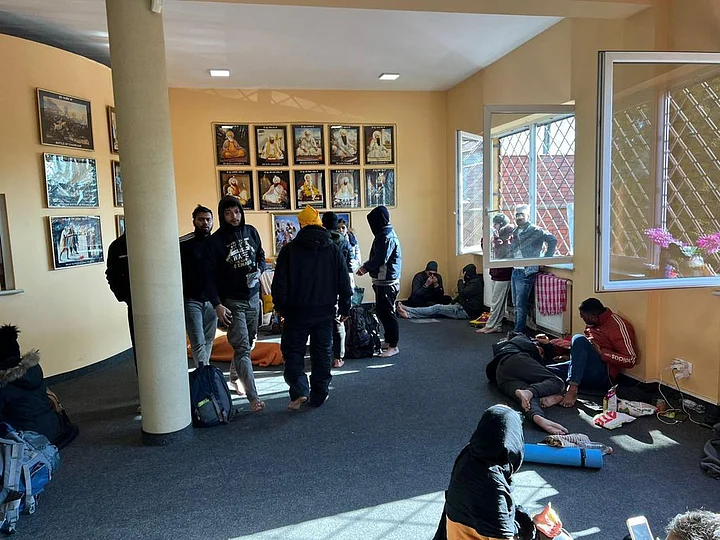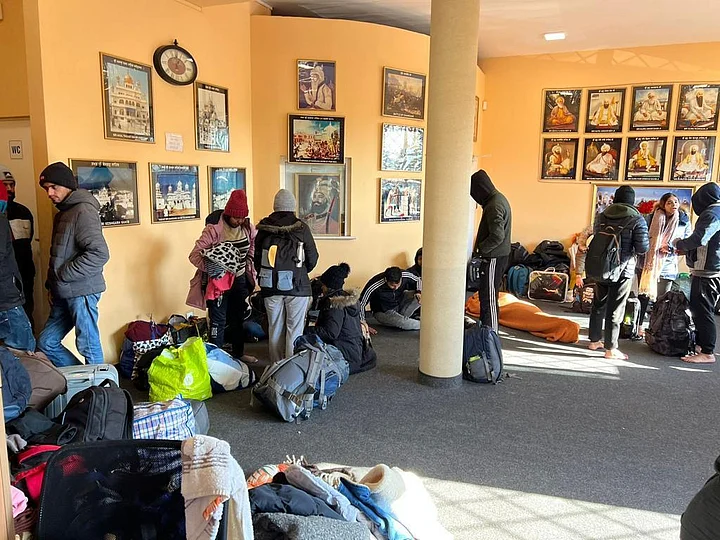“People know a gurdwara is a place where anyone can take refuge – their nationality and religion don’t matter,” Navjot Singh, a caretaker of Gurdwara Sri Guru Singh Sabha, located in the suburbs of Polish capital Warsaw told The Quint.
Over the last four weeks, since the invasion of Ukraine by Russia on 24 February, over 300 refugees across nationalities have found shelter inside the humble premises of the gurdwara.
"We’ve received not only Indian refugees, but also Pakistani, Nigerian, Nepali, and Ukrainian refugees," Singh said, adding that they still continue to receive people seeking shelter.
As the number of refugees grew in the initial weeks, the gurdwara reached out to the Hindu Bhavan temple, 16 km away from its premises, and solicited them to house a few of them as well.
To this day, some of these refugees are still staying on the premises of the gurdwara and the temple, even though the number has dwindled in the last one week.
'War of Segregation, Racism'
One of them is Srinivas – an Indian from Ukraine, who crossed the Medyka border on 4 March.
"My feet were bloody and sore. I was denied entry into the train from Kyiv. Pushed out and left on my own, I waited for 12 hours to take the train and then arrived in Lviv the next evening," recounted Srinivas.
He is among hundreds of Indians who walked for days and reached the Polish border, only to fight another war – a war of segregation, racism, and discrimination for his nationality.
His ordeal didn't end at Lviv. Speaking to The Quint, he said:
"I walked for 55 km from Lviv to the Medyka border – without food, water, and sleep. But I was pushed back at the border because I am Indian. The guards on the Ukrainian side were not letting us through and were only letting their own people pass. Along with me, other non-White people were segregated, and I stood in the line for a whole seven days. With a group of Indians, Pakistanis, and Bangladeshis, I spent the whole week trying to get to Poland."
After crossing the border, Srinivas and a group of South Asian refugees from Ukraine contacted Indians in Poland.
"After having faced such racism, we knew the only people we could rely on, were other Indians in Poland. We called the Indian restaurants in Warsaw, found social media posts, and found out that the Hindu Bhavan Temple and Gurdwara Sri Guru Singh Sabha were hosting refugees," explains Srinivas.
Srinivas and his group of seven refugees stayed with the gurdwara and then the temple for four weeks.
- 01/02
Gurdwara in Warsaw.
(Photo Courtesy: Deepa Parent)

- 02/02
Gurdwara in Warsaw.
(Photo Courtesy: Deepa Parent)

Refugees & Volunteers in Gurdwara
Ukrainians Ludja and her 83-year-old bedridden mother escaped from Chernivtsi soon after the war broke out. Holding back her tears, Ludja told The Quint:
"My daughter works with the Sikh community in Canada, and when she told them we needed shelter and rescue, they contacted the community of Warsaw. These kind people picked us up, gave us shelter, food and are treating us like family. You know, I haven’t told anyone here because I’m indebted to them, but today is my birthday and my life will never be the same."
"We’ve not asked for help from the embassy or the authorities here. Our communities have helped each other. The Indian community has donated necessities and so much more that we distributed those in the stations to refugees," says Singh, the caretaker.
Among the volunteers in the gurdwara, is a group of young Sikh men who drive taxis in Warsaw. They have not only been transporting supplies to refugee centres but also helping refugees find shelters in either the gurdwara or the temple.
Sunny Singh, a native of Ludhiana, Punjab, is one of the volunteers. "For us, everyone is equal, and our community has worked together to help these people fleeing the war. I’m grateful that we could help refugees. This is the time for all communities to stand with humanity without questions of what their religion is or where they’re from."
A Refugee Who Became a Caretaker for Hindu Temple
Harish Lalwani, president of the Hindu Bhavan Temple in Warsaw told The Quint that the two communities coordinated to provide a safe space for refugees.
"These refugees will stay here until they decide to go back home or move on to another country. We have a family here that wants to stay in the temple until the war is over so that they can go back to Ukraine. Some of them have found jobs and will stay here," reveals Lalwani.
Among the refugees housed in the Hindu temple, is Jayanti Bhai, a native of Ahmedabad, Gujarat. He arrived in Kyiv just a few weeks before Russia attacked Ukraine, and was to work in a fruit-packing company. But the war disrupted his plans.
"I had only just arrived and got a temporary resident card and wasn’t given a chance to work or make a living here. I am the sole breadwinner of my family and I spent over Rs 6.5 lakh to come here, of which over Rs 3.5 lakh is debt," Jayanti Bhai told The Quint.
Jayanti Bhai spent $250 on a taxi ride from Kyiv to Lviv on 24 February and crossed the border after waiting in line for 48 hours. He found refuge at the Hindu Bhavan temple and is now appointed as the caretaker of the temple.
"I’m 44 and I won’t find the opportunity to come abroad again and that’s why I stayed back here. Thanks to the Hindu temple’s committee, I can now work here and send money home to pay off my debts," he adds.
Unlike Jayanti Bhai, we met Indian refugees from Ukraine who have had to leave their successful business ventures behind and are now waiting for the war to end so they can go back, pick up the pieces, and rebuild a life in Ukraine.
'Don't Know What To Do Next'
One such refugee is Mukesh Saha, who runs a pharmaceutical company in Ukraine. He has lived in the country for 27 years. The Quint met him in the gurdwara where he plans to stay until the war ends.
"Honestly, I do not know what to do next. I’m going to wait here and decide later. My wife is Ukrainian and so is my eight-year-old son who wants to go back home. Thanks to Babaji, they provided me with a laptop in the gurdwara to figure out what to do next. I’m indebted to the Sikh community here in Warsaw," shares Saha.
Among families that have left all that they own behind in Ukraine is the Sharma family which owns an Indian sweets shop and cafe in Kyiv.
Kamlesh Sharma, a 55-year-old woman, and her son, 27-year-old Ashish, who drove from Kyiv to the Ukrainian-Polish border soon after the war started.
"My mother and I drove 1,000 km in the next three days. We stopped by petrol stations as we were only allowed 15-20 litre at a time and gradually reached the border," adds Ashish.
“When we were escaping, a group of men asked us to give donations to the Ukrainian army, at gunpoint. I knew these were scammers, but because even civilians were given arms, it was utter chaos and scammers were trying to loot people.”
Ashish and his mother Kamlesh plan to stay in the Hindu temple until the war ends and are looking forward to rebuilding their life in Kyiv. Meanwhile, Luda and her mother are attempting to move to Canada and rejoin her daughter.
The Sikh and the Hindu communities of Warsaw continue to rescue refugees and hope peace returns to Europe.
Speaking over the phone to update us on the current situation, JJ Singh, chief administrative officer at the Gurdwara Sri Guru Singh Sabha, says, "Although the influx of refugees to the Gurdwara has reduced, the situation remains the same. Few people are still coming in every day, taking refuge here. We have 18 refugees as of now, and we will provide all the help they need until peace prevails."
(The author is an independent journalist based out of Paris. An alumna of University College Dublin, she writes about international conflict and war.)
(At The Quint, we question everything. Play an active role in shaping our journalism by becoming a member today.)


